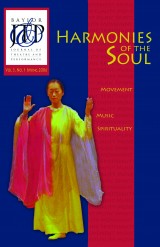
Harmonies of the Soul
Spring 2006
Letter from the Editor
Editorial: Purpose and Parody in “Religious” Musical Theatre
Judith Sebesta
Feature: Urinetown, September 11, and the Carnivalesque
Erica Milkovich
Abstract: Taking into account the medieval carnivalesque structure and lower-body humor present in Urinetown, this article argues that the musical’s popularity during the post-September 11 Broadway season can be attributed to the carnivalesque emerging within theatrical performance. Milkovich cites Bakhtinian notions of the medieval aesthetic while analyzing segments of the musical to illustrate a suspension of theoretical borders between the carnivalesque and traditional theatre. She notably challenges the thoughts of Victor Turner and Baz Kershaw concerning theatrical performance, and demonstrates howUrinetown expresses the solidarity, ambivalence, and possibility for societal regeneration inherent in the carnivalesque and longed for in the aftermath of September 11.
Feature:Winds and The Ways of the Wu: Toward a Ritual Performative Synthesis in Early China
Dallas McCurley
Abstract: This article explores reasons for the extraordinary power ascribed in early China to yue, (ritual court dances synthesizing music, costume, and dance-props). The fundamental premiss was paradoxical: that in performatively imitating the ways of Heaven (tian), yue could regulate tian, that is, restore harmony to cosmic, social, and other disequilibria. Imitation and regulation were alike held to be possible insofar as the ritual dances were integrated into the order of the cosmos, performed as nodal points in an intricate spatio-temporal network charted by detailed ‘correlative thinking.’ This had its beginnings in earlier shamanic performances of mimetic magic attuned to cosmic/spirit audiences, among them the wind, harbinger of the rain that was urgently sought during recurring periods of drought. The article looks briefly at the bureaucratic systemization of both shamanic rites and the court ritual dances which were supposed to be performed not by shamans but by young nobles trained in a ritual college. This systemization, regulated by correlative cross-referencing, divided yue into opposing but complementary categories mirrored in the cosmos.
Feature: Ma’amarot: Staging the Agon of the Jewish Morning Service
Sarit Cofman-Simhon
Abstract: Ma’amarot, a production based on the Jewish Morning Service, was performed in Jerusalem between 2000 and 2004 by a group of seven male actors, all of whom were religiously observant in the Jewish faith. The production makes use of the Morning Service (Shaharit), the most elaborate of the three prescribed daily prayers. Subtitled “a voice and movement performance,” Ma’amarot explores the practice of praying, which for these actors is a fixed and obligatory part of their daily routine. Theirs is not a theatrical representation of the prayer, rather a usage of theatre to reflect on religious practice: onstage an imagined Morning Service is taking place, while the actors make visible and audible the introverted conflict the worshiper undergoes in the course of the prayer. Spatially the performance operates as a site of seven separate individuals, whereas vocally, it forms a sonorous congregation. This choice reflects and preserves the nature of the synagogue service.
Feature: Celebrating African-American Music and Spirituality in August Wilson’s Joe Turner’s Come and Gone,Ma Rainey’s Black Bottom, and The Piano Lesson
C. Patrick Tyndall
Abstract: Tyndall discusses Wilson’s effective use of music and spirituality to empower his characters, audience, and the African-American Community at large. The three selected plays chronicle the “slice of life” for Blacks from post-Reconstruction to the Great Depression. Tyndall states that most of Wilson’s characters are searching for their own song. Moreover, music often serves as a character. The essay examines the playwright’s goal in the “cycle plays” of showing the process African Americans undergo in this quest. Song and spirituality are modes to navigate the present and future and (re)discover one’s identity as they move into positive futures in Wilson’s work. The characters are in search of their unique, individual songs, which are suppressed and repressed because of their placement in American society. According to Tyndall, “[d]etecting one’s song allows the character the ability to move on with their lives, with empowerment of spirituality and the past to guide said character.”
Highlight: An Interview with Stephen Schwartz
Judith Sebesta
Profile: Institute for the Study of Performance and Spirituality
Edmund Lingan
Book & Performance Reviews:
- John D. Martin-Carnival and Other Christian Festivals, Max Harris
- Dixie Beadle-The Islamic Drama, Jamshid Malekpour
- Michael Chemers-Bodies in Commotion, Carrie Sandhal & Philip Auslander (Eds.)
- Herbert Sennett-The Bible as Theatre, Shimon Levy
- Shannon Rose Riley-“Horizon” at Mondavi Center
- Elizabeth Lee-Brown-“The Tricky Part” at San Jose Repertory Theatre
- Michelle Mills Smith-“Begum Barve” at the University of Georgia
